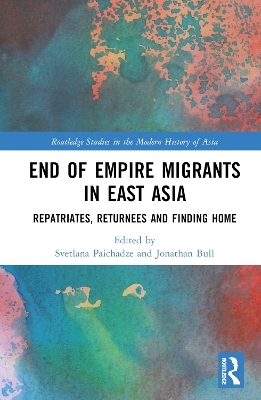
End of Empire Migrants in East Asia
Routledge (Verlag)
978-1-032-28497-2 (ISBN)
Through the collection of first-hand testimonies and examination of four key themes, the book uncovers how the Japanese government’s repatriation policy intersected with people’s experiences of end of empire migration in East Asia. The first theme, repatriation as historiography and discourse, examines how repatriation has been studied, debated and represented in Japan since the end of the Second World War. The second theme, finding home in the former empire, reveals the diversity of experiences of the peoples of former colonies as the borders ‘shifted under their feet’ through first-hand testimony. The third theme, government policy, explores the changing Japanese government policy from the 1950s to the 1970s. The fourth theme, integration after repatriation, reveals how Japanese former colonial residents integrated into Japanese society following repatriation.
Presenting the collective research of 14 international authors, this book will be of interest for researchers of East Asian history, modern Japanese history, migration studies, postcolonial studies, Japanese studies, Korean studies, post-war international relations and Cold War history.
Svetlana Paichadze is an Associate Professor at the Research Faculty of Media and Communication, Hokkaido University, Japan. Her main research themes are the education, identity and language issues of Russian-speaking diaspora and her publications include Identity, Language and Education of Sakhalin Japanese and Koreans: Continual Diaspora (2022), Voices from the Shifting Russo-Japanese border: Karafuto/Sakhalin (co-edited, 2015) and Saharin zanryū: nikkanro hyakunen ni wataru kazoku no monogatari [Left-behind on Sakhalin: A Centenary History of Families Living Between Japan, Korea, and Russia] (co-authored, 2016). Jonathan Bull is a Lecturer at the Research Faculty of Media and Communication, Hokkaido University, Japan. His research focuses on the social and cultural history of Japanese end of empire migration and has been published in the Journal of Contemporary History, Journal of Migration History and Cultural and Social History.
Introduction Part 1: Repatriation in historiography, political discourse and the history of Indigenous Peoples 1. Japanese-language historiography about end of empire migration: revising the extruded history of repatriation and hikiagesha 2. Hikiagesha and other terms for returnees in the minutes of the National Diet of Japan 3. Travel, forced movement, ‘repatriation’: multiple mobilities in the history of the Indigenous Peoples of Sakhalin and the Kuril Islands Part 2: Finding ‘home’ in the former Japanese Empire 4. The ‘repatriation’ of Japanese wives from Manchuria to Taiwan: a presence hidden by multiple factors 5. The social movement for Sakhalin Korean repatriation after the Second World War: the establishment of the Korean Communist party 6. The ‘Remembered’ Sakhalin Koreans in the South Korean Press, 1946-1980 7. Between loving the country and loving the land: the case of waishengren and hwagyo Part 3: Repatriation policy and returning home in the 1950s-1960s 8. The boundary formation between ‘hikiage’ and ‘kikoku’: the case of the ‘honkoku kikansha’ from China 9. Individual multiethnic repatriation from the Soviet Union 10. The ‘delayed "repatriation"’ of Japanese women in Korea: the beginning of the return policy in postwar Japan Part 4: Repatriation and integration: life after hikiage 11. Industry-induced movements of people and connections among repatriates from the Karafuto coal industry 12. The socioeconomic reintegration of repatriates: evidence from Gifu prefecture 13. An anthropology of nostalgia: wansei’s postwar life and their Taiwan recognition 14. Border, Indigenous Peoples, self-identification: contested memory as seen in the social activities of Ainu, Uilta and Nivkh
| Erscheinungsdatum | 17.04.2023 |
|---|---|
| Reihe/Serie | Routledge Studies in the Modern History of Asia |
| Zusatzinfo | 16 Tables, black and white; 5 Line drawings, black and white; 13 Halftones, black and white; 18 Illustrations, black and white |
| Verlagsort | London |
| Sprache | englisch |
| Maße | 156 x 234 mm |
| Gewicht | 689 g |
| Themenwelt | Naturwissenschaften ► Geowissenschaften ► Geografie / Kartografie |
| Sozialwissenschaften ► Politik / Verwaltung | |
| Sozialwissenschaften ► Soziologie ► Spezielle Soziologien | |
| ISBN-10 | 1-032-28497-8 / 1032284978 |
| ISBN-13 | 978-1-032-28497-2 / 9781032284972 |
| Zustand | Neuware |
| Informationen gemäß Produktsicherheitsverordnung (GPSR) | |
| Haben Sie eine Frage zum Produkt? |
aus dem Bereich


